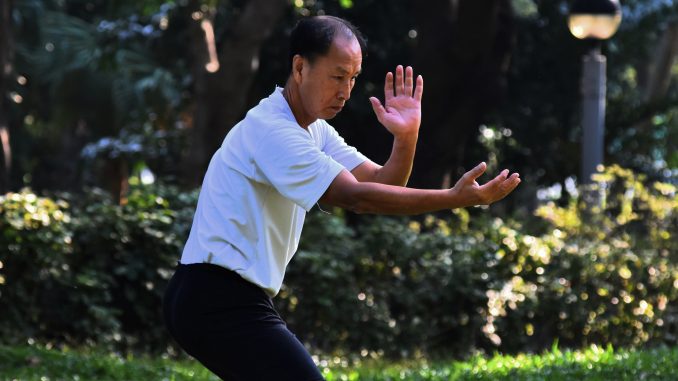
Eating a well-balanced diet rich in nutrient-dense, plant-based foods with healthy fats is an eating pattern people with Parkinson’s and their families can benefit from. In addition to eating well, what else can people with Parkinson’s do, that may benefit their condition? While playing a board game such as Chess may boost brain power and slow cognitive decline, what about practicing Tai Chi? Could this complementary therapy benefit people living with Parkinson’s? Before looking at the evidence from a recent meta-analysis, let’s first take a closer look at Tai Chi.
What is Tai Chi?
Tai Chi is a traditional Chinese exercise and martial art practice composed of flowing and graceful movements. It is a gentle exercise style that focuses on calming the mind and using mental intention, body mechanics and internal energy to drive its techniques.

Lower limb function in people with Parkinson’s
Parkinson’s’ disease often affects lower limb motor function, such as balance, gait, and mobility. Balance disorders can impair quality of life and function, and greatly increase the risk of falls.
A meta-analysis conducted in 2023 looked at the influence of Tai Chi on lower limb function in people with Parkinson’s. In this analysis, 10 high-quality randomized controlled trials, with a total of 532 participants, were studied. Tai Chi styles varied amongst the studies and included Yang style and Chen style. Intervention times ranged from 1 to 12 months with control groups either receiving no intervention or low-intensity exercise, such as walking and stretching.
Results of the analysis were positive and showed Tai Chi improved motor function, balance function, functional walking and gait speed in participants with Parkinson’s. No differences were seen in the results whether the study length was greater than 24 weeks or less than 24 weeks. Overall, there was insufficient evidence to determine the optimal length of time to participate in Tai Chi to obtain benefits.
Unfortunately, in this analysis, no benefits were seen in regards to walking endurance, step length or cadence (related to walking speed).
Authors of this meta-analysis concluded that further research is required including which style of Tai Chi worked better and what effect it has on different subtypes of Parkinson’s. Looking beyond motor function was also suggested as a limitation of the current study.
Final thoughts
Practicing Tai Chi improved motor function, balance function, functional walking, and gait speed in this analysis of 10 randomized controlled trials. Although further research is required, in the meantime with its holistic approach and multi-benefits, Tai Chi is worth considering if you have Parkinson’s.
As always, consult your medical team before starting any kind of exercise regime and seek help from a qualified health professional to teach you how to practice Tai Chi correctly. Joining a local exercise group is a great way to stay socially connected while enjoying the potential benefits of this traditional Chinese exercise and martial art practice.
Sources
- Agarwal P., et al. MIND Diet Associated with Reduced Incidence and Delayed Progression of Parkinsonism in Old Age. The journal of nutrition, health & aging, 2018, 22(10), 1211–1215.
- Medscape, Playing Board Games May Slow Cognitive Decline, Improve QoL Oct 2023.
- Zhu PA., et al. Efficacy of Tai Chi on lower limb function of Parkinson’s disease patients: A systematic review and meta-analysis. Front Aging Neurosci. 2023 Feb 1;15:1096417.
Parkinson Diet – Terms & conditions / Privacy policy


